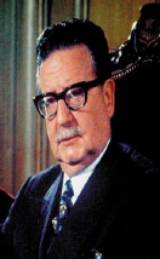
|
Dr. Salvador Allende (1908-1973)
|
1968-1976, Chile: Killing a Democracy
By John Foran, Department of Sociology, University of California, Santa Barbara.
Salvador Allende was the first democratically-elected socialist ruler in world history. He presided over a polarized society and a complex coalition. The U.S. was pledged to reverse his project of constructing a Chilean path to socialism.
The 1970 presidential elections were a contest between Christian Democrats, the conservative National Party and the Popular Unity (UP) coalition, of communists, socialists, the Radical Party, Unitary Popular Action Movement and two smaller parties. Allende of the Socialist Party was the UP candidate.
A brutal military coup overthrew the government on September 11, 1973. Allende died fighting in the presidential palace. The U.S. gave the material aid, logistical support and swift diplomatic recognition to the military junta. Inside Chile there was support from fascist and anti-communist groups, large landowners, industrialists and owners of the mass media. All of these groups did not have much of a social base despite their material resources. A social base for the coup was Chile's middle classes, who were economically hard hit by inflation and shortages. Groups like professionals, small shop owners, the truck drivers and others provided an atmosphere of public support for the coup. Chile's population was being bombarded by anti-communist messages in the media, which under Allende was perfectly free to say whatever it wanted.
The workers, unarmed and unprepared for a civil war could not resist the coup, which brought General Augusto Pinochet to power. The junta - the new military leadership - killed some 30,000 UP supporters in its first few months in power. Most were arrested, tortured and disappeared. Fifteen years later, after countless demonstrations and suffering, Chileans restored their democracy through a decisive repudiation of Pinochet at the polls.
Source: "Allende's Chile, 1972," 1996
www.gisp.ucsb.edu/lais/case4.htm
"I don't see why we should have to stand by and let a country go communist due to the irresponsibility of its own people."
"The issues are much too important for the Chilean voters to be left to decide for themselves."
Henry Kissinger
"Make the economy scream."
Richard Nixon
"He [Pinochet] may have been a son of a bitch but he was our son of a bitch."
Anonymous U.S. official
"It is the firm and continuing policy that Allende be overthrown by a coup."
CIA memo
"Workers of my fatherland, have faith in Chile and her destiny. Others will over- come this grey, sad moment when treason strains to conquer. Go forward knowing that much sooner than later, the great avenues will open anew to let pass free people to build a better society."
Salvador Allende, in a radio broadcast just before his death during the coup, September 11, 1973. www.bcpl.net/~jnlstrss/chile/allende.htm
medical degree, University of Chile (1932)
co-founded the Chilean Socialist party (1933)
was elected to the Chamber of Deputies (1937)
Minister of Health in leftist coalition (1939-42)
won the first of four elections to Senate (1945)
was elected President of Chile (1970-1973)
nationalized U.S.-owned copper mines (1970)
was overthrown by a U.S.-backed military coup, in which 13,500 were detained and 5,000 killed, including Allende (1973)
U.S. Documents on Chilean Coup Declassified on Nov. 2000
On November 13, 2000, more than 16,000 secret U.S. records were released on the U.S. role in overthrowing Chile's government in 1973. Over 50,000 pages of State Department, CIA, White House, Defense and Justice Department records were released.
Included are 700 controversial CIA documents on U.S. covert operations from 1968 to destabilize Allende's democratically-elected socialist government and, after the violent 1973 coup, to bolster Augusto Pinochet's military regime.
The release includes dozens of records on the 1976 assassination in Washington, DC, of former Chilean ambassador Orlando Letelier and his U.S. associate, Ronni Karpen Moffitt.
Source: National Security Archive, Press Release, Nov. 13, 2000.
www.gwu.edu/~nsarchiv/news/20001113/
Read some of the documents online at www.gwu.edu/~nsarchiv/news/20001113/